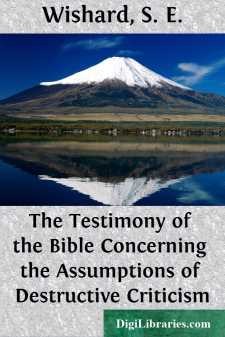Categories
- Antiques & Collectibles 13
- Architecture 36
- Art 48
- Bibles 22
- Biography & Autobiography 813
- Body, Mind & Spirit 142
- Business & Economics 28
- Children's Books 14
- Children's Fiction 11
- Computers 4
- Cooking 94
- Crafts & Hobbies 4
- Drama 346
- Education 46
- Family & Relationships 57
- Fiction 11829
- Games 19
- Gardening 17
- Health & Fitness 34
- History 1377
- House & Home 1
- Humor 147
- Juvenile Fiction 1873
- Juvenile Nonfiction 202
- Language Arts & Disciplines 88
- Law 16
- Literary Collections 686
- Literary Criticism 179
- Mathematics 13
- Medical 41
- Music 40
- Nature 179
- Non-Classifiable 1768
- Performing Arts 7
- Periodicals 1453
- Philosophy 64
- Photography 2
- Poetry 896
- Political Science 203
- Psychology 42
- Reference 154
- Religion 513
- Science 126
- Self-Help 84
- Social Science 81
- Sports & Recreation 34
- Study Aids 3
- Technology & Engineering 59
- Transportation 23
- Travel 463
- True Crime 29
The Testimony of the Bible Concerning the Assumptions of Destructive Criticism
by: S. E. Wishard
Categories:
Description:
Excerpt
I. OUR ATTITUDE TOWARD DESTRUCTIVE CRITICISM.
"Be ye therefore followers of God, as dear children; and walk in love, as Christ also hath loved us." Eph. v. 1, 2.
"Be patient toward all men. See that none render evil for evil unto any man; but ever follow that which is good, both among yourselves and to all men." 1 Thess. v. 14, 15.
"He that believeth shall not make haste." Isa. xxviii. 16.
"The works of his hands are verity and judgment; all his commandments are sure. They stand fast forever and ever, and are done in truth and uprightness." Psa. cxi. 7, 8.
"My counsel shall stand, and I will do all my pleasure." Isa, xlvi. 10.
The attitude which God's people should assume toward destructive criticism has been questioned. It should certainly be a position of calm patience, that can deliberately weigh valid testimony, and abide by the decision of intelligent judgment. The history and life of the Church for nearly two thousand years should go for something. They are not to be swept away by the bluff, the egoism of what claims to be the only "Expert Scholarship."
There is no occasion for a panic. Truth that has been, and has builded noble, goodly life, is truth still, and ever will be. It is not a time for denunciation. The assumptions of the destructive critics are so enormous, so radically revolutionary, so directly aimed at vital truth, that one's heart is stirred. There is danger of yielding to the heat of a righteous indignation. It is not well to lose one's intellectual and moral poise, even in a contest involving the honor of God and the welfare of immortal souls. But "he that believeth shall not make haste."
The lovers of the Book that has safely passed through every storm of antagonism that the Prince of Darkness could evoke, need not now be moved to hasty utterance. The eternal foundations of truth, like him who laid them, are "the same, yesterday, to-day and forever." The Book, with all its precious doctrines, is here to stay. It can not be destroyed. Fire has not burned it, water has not quenched it, the edicts of tyrants and popes have not been able to break its power. The Church of God can calmly rest on "the word of God, which liveth and abideth forever." (1 Peter i. 23.) Hence we may calmly move on undisturbed in our work.
Further, our attitude should be marked by an intelligent understanding of the question involved. It is not a question of fair, honest criticism, for the purpose of a deeper knowledge of God and his truth. All reverent and helpful study of the Word of God is critical, and is the kind of criticism that the Book challenges. Our Lord invites it, and urges us to "search the Scriptures," which testify of him.
It is assumed by the rationalistic critics that we have entered a new era, that the Bible has never been studied until within recent years. This is an assumption unworthy of scientific scholarship. Critics who have not sought to destroy the Word of God, but, by thorough investigation, to determine its claims, have been at work on the Scriptures in all the past, seeking to know the mind of the Spirit....


